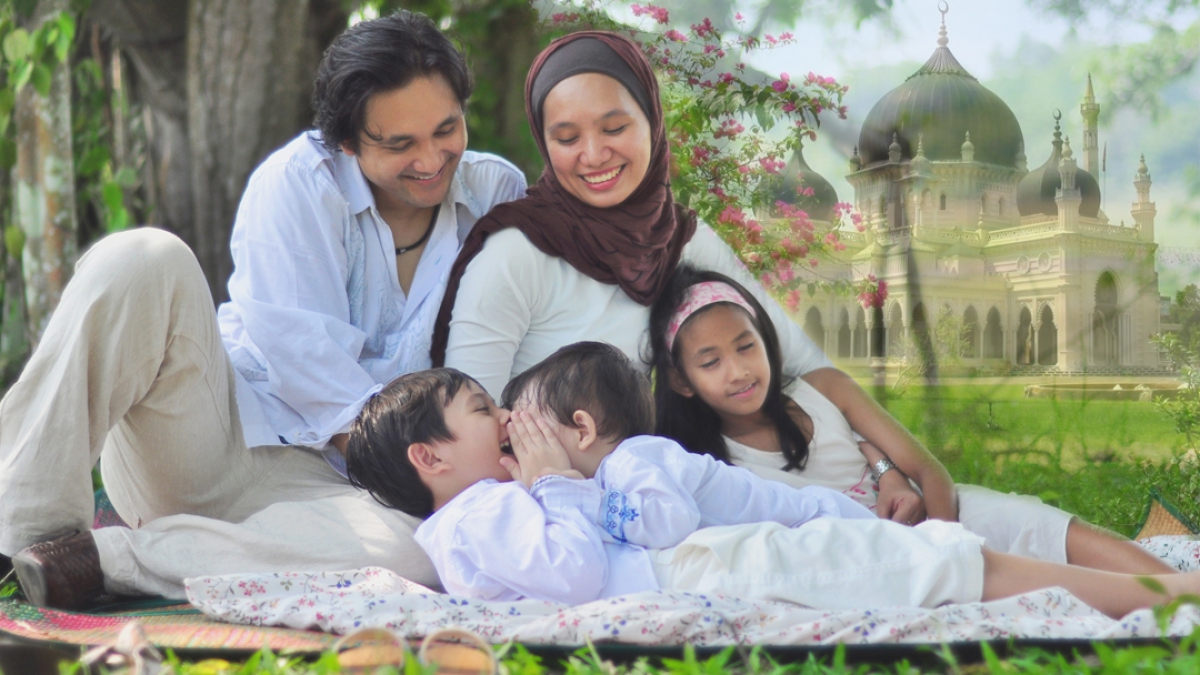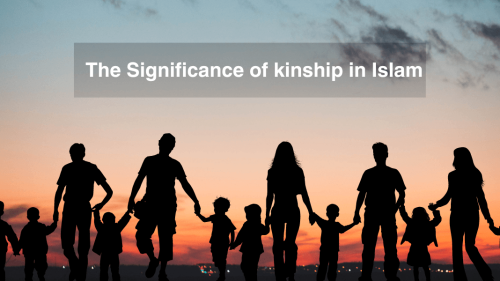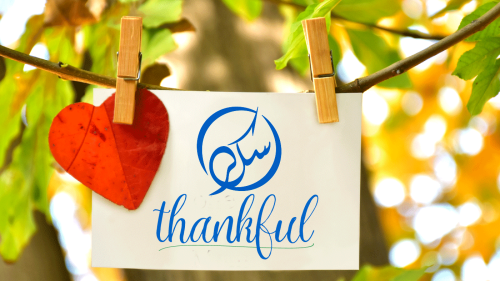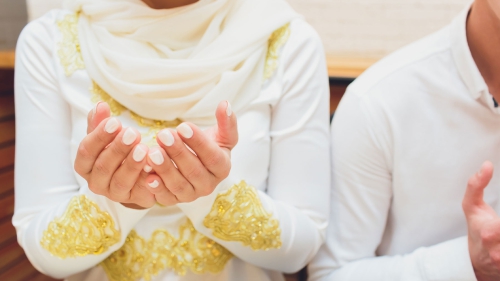The Family Institution in Islam

The Western society as a whole is in a deep social crisis. This is primarily due to the breakdown of family institution through dominant secular forces. Family constitutes the foundation of a society and on its strength or weakness lies the strength or weakness of its society. If the family institution is weak nothing else can make up for this weakness. Therefore, despite its present greatness, the entire West is heading towards a disastrous end.
The breakdown of Western families is proceeding at an alarming speed. Rising divorce rates show that the West tops the world. In 2014 the United Sates stood at 10th place with 53%, and Belgium led at 71%. With a population of 320 million it is estimated that there is one couple breaking up in the U.S. every 6 seconds. Unbelievable ! Isn't it?
Less than 50% American children live in a first marriage family, and the fastest growing form of family is a single mother.
Two of the biggest problems among children are teenage pregnancy and drug abuse. In 2012, 89% of pregnancies in ages 15-19 years were outside of marriage. And the newborns are often left at the doors of others or dropped into dumpsters.
One could go on dwelling into other problems that the Western society is suffering from. Among these, drinking alcohol and use of other drugs, which have bad consequences for a family.
But let us discuss the subject of Islamic family and its importance for Muslims.
I will quote Ismail Faruqi, a great Islamic intellectual who was a professor of religion at the Temple University and a founder of International Institute of Islamic Thought in Herndon, Virginia.
He observed, "The Islamic family, if it is rightly Islamic, is the very ideal to which Western people aspire. In other words, the reality of Western people today stands diametrically opposite; if they can say that they can stand at the bottom at the bottom of human, social, and ethical development, because of what we see happening around us in their midst, the Islamic family with its ideals, with its norms and standards, stands at the opposite highest, and therefore, there could be no better way of convincing Western man, the non-Muslim man or woman, of the value of Islam, of the greatness of Islam, than to invite them to visit a Muslim family."
However he warned Muslims, "But then, the Muslim family must be a good one. In other words, it must be truly Islamic and it must live up to the standards expected of an Islamic family."
Let us compare and contrast some of the reasons for the wellbeing of an Islamic family versus a Western family.
1. Even before an Islamic family is started it carries divine blessings on the premise that there no sex before marriage. Thus it saves Muslims from the evils of sexual promiscuity that is rampant in the West. It is the cause, among others, of the spread of venereal diseases.
In the Western societies virginity is looked upon as an oddity. The youngsters mix freely with one another and have sex as they desire with more than one partner. And this habit continues after they get married. Therefore, there is great infidelity in marriage. And even a father may not consider that children born are legitimately his - leading to his emotional ruin.
In females, this is the cause of widespread teen-age pregnancy and of unmarried mothers.
2. Islam confers different roles of man and woman. As such, women do not compete with men, but complement each other.
This is clear from the following Qur'anic verse: "Husbands are the protectors and maintainers of their wives because God has given the one more strength than the other, and because they support them from their means." (Al Nisa 4:34).
Islam assigns the family leadership role to men because God has endowed them with somewhat greater physical and emotional strength and endurance. As such men are responsible for supporting all female relatives in addition to their own household.
On the other hand, God made women biologically and psychologically very much suited to concentrate on the home and family and all that is required to operate and develop this institution and its associated areas.
This is a tremendous responsibility. And no one else can either take it away from her or adequately attend to it.
Let me quote from Khurshid Ahmad another great Islamic intellectual: "The function of child-bearing remains incomplete without its more crucial part of child-rearing and upbringing -their education, orientation, character-building and general initiation into religion and culture. If is because of this aspect that family care becomes a full-time job. No other institution or even a number of institutions can take care of this function."
However, differences in roles or functions between men and women do not mean differences in their humanity. Or that one is superior to the other.
The Qur'an tells us at several places on the equality of men and women before God and in His judgment in the Hereafter. For example: "If any do deeds of righteousness - be they male or female - and have faith, they will enter heaven. And not the least injustice will be done to them." (Al Nisa 4:124)
3. An Islamic family begins with affinity between the two families and prospective spouses. The courtship between husband and wife starts after marriage and grows and becomes stronger with passage of time. And marriage is the beginning not the consummation of this process of courtship and love.
In the Western system, love and courtship start before marriage. Marriage is the culmination of this relationship, and there is no excitement left to look forward to in marriage except the burden of responsibility.
4. Arranged marriage in Islam means a marriage not of two individuals, but of two families. As such the two families with all their human, economic, and wisdom resources are at the service of newly married couple. And all these resources are available for the two spouses if there is any problem.
In stark contrast, young men and women in the West meet on their own and decide to get married. As such after marriage they are left on their own, and there no one to help or guide them to solve their marital problems.
5. Marriage in Islam means a civil contract between two individuals with the backing of two families. It requires consent of the two entering marriage, is signed and agreed upon and witnessed by guardians and elders of the spouses and becomes a legal and binding document. It serves like a constitution for the home state with all of its functionaries with responsibilities in the home.
The Western marriage has no constitution. It calls marriage a sacrament but is without any defined framework and when there is trouble between couples, it resorts to custom, common law and whatever the judge may arbitrarily decide.
6. In Islam a woman, married or single is seen as a person in her own right, and not merely an adjunct to another person. As such, she has full right of ownership and disposal of her own property and earnings, even after marriage. When she is married, she retains her family name, instead of adopting her husbands.
Despite its other achievements, the West has still to learn a great deal from Islam on the question of legal status of women, regardless of marriage relationship.
7. As stated above, marriage in Islam is a commitment of the spouses and their families to each other, and therefore it increases the sense of responsibility among them and induces a spirit of sacrifice for each other. And defeats and overcomes any individual selfish tendency for their common good. As a result Muslim families are stable as indicated by low divorce rate in Muslim countries.
There is no stability in marriage in the Western societies, as discussed above. After all, marriage requires adjustment to the new situation by the two spouses, and the two have to compromise to find a common ground as a solution to the problems encountered.
Since people in Western societies are highly individualistic, the essential ingredient of sacrifice for each other is missing in the West. Therefore, marriages have a very tenuous relationship and people stay married as long it is convenient for them. Each of the couple insists on fulfilling his/her personal idiosyncrasies, and none is willing to give in.
And when problems develop along with declining morals, they seek comfort elsewhere which results in infidelity, which is so very common. Finding solutions to marriage problems takes time, and instead of waiting most marriages in the West end up in divorce courts.
8. A most important characteristic advocated by Islam is an extended family system. Dr. Faruqi calls the extended family of Islam as "the noblest, the greatest, the most valuable social institution the world has ever seen." And that, "By going nuclear, that is to say by going individualistic, Western society has lost all these values and they are suffering terribly."
An extended Muslim family is endowed with all its human wisdom and all the resources that it could contribute.
Because we live with our parents and our elders who have brought us up, played with us at our young age, told us stories, were patient with us, educated us, guided us, advised us - so we love them because we are in constant communion with them.
However in the West there is alienation, and as soon as a youth grows up, he strikes out on his own. And when parents are old there is no respect for them and they end up pining for their children in old or nursing homes.
There could be no more cruel death than dying slowly in these homes for old age, away from their progeny, deprived of the love of their own children. Respect for elders has to be cultivated and it cannot be cultivated by separation from them. This is the greatest benefit of extended family.
There are numerous other advantages of an extended family. Such as if there is a real need by the community, a Muslim woman can have career without jeopardizing the upbringing of children, because there are others to take care of them.
Also, an extended family meets the needs of its individuals at different times. The need for love, for play, for consulting and counseling, for letting out the pent-up emotions, and so on and so forth.
And most importantly, there is no generation gap in an extended family. Thus social norms and values are passed on from one generation to the next, and there is a continuity between generations without a generation gap. This important quality is gravely missing in the Western societies.
A last point that the current research has shown is that as a result of the support system provided by an extended family, its individuals do not suffer from many of health complications and illnesses - such as depression, psychological and mental disorders, and even diseases such as cancers.
In summing it up, here in America it is important to emphasize on brothers and sisters to stay chaste, guarding the elements of respect and shame within their God-given bodies. And to consult with parents regarding selection of marriage partner, and live in close contact with extended family - we will ignore them only at our peril.
Giving utmost attention to these characteristics is extremely important because living in the same environment American Muslims are facing the same problems. It should be a cause of great concern for us that among American Muslims there are frequent reports of domestic violence and increased divorces - now estimated at about 31 percent. And if we are not careful we would get into more and more problems losing our very identities as Muslims. We must reform ourselves as well as teach others of the beauty of Islam: It is a vital role that we have to play for our good, the good of America and the wider humankind.
Notes:
1. Ismael Faruqi, Role of Family in the Spread of Islam, http://joerzack.tripod.com/role_of_the_family_in_the_spread.htm.
2. Khurshid Ahmad, Family Life in Islam, The Islamic Foundation, Thrid Edition, Leicester, U.K., 1980.
*****
Siraj Islam Mufti, Ph.D. is a journalist and author. This article was given as Friday sermon and is part of his upcoming book on Family and Islamic Civilization due in November 2015. His two other books are Muslims At The Crossroads, 2012 and Basic Islamic Dynamics, 2015.
Related Suggestions

















